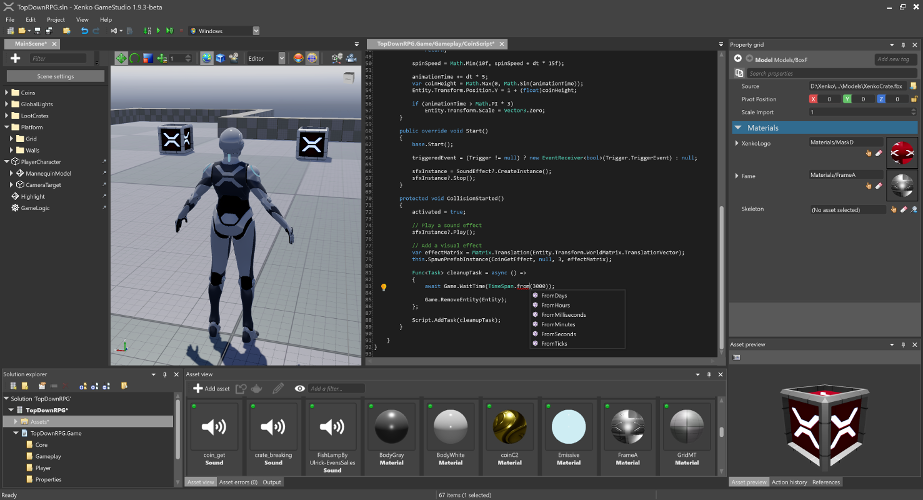Welcome to the Stride source code repository!
Stride is an open-source C# game engine for realistic rendering and VR. The engine is highly modular and aims at giving game makers more flexibility in their development. Stride comes with an editor that allows you to create and manage the content of your games or applications visually and intuitively.
To learn more about Stride, visit stride3d.net.
Stride is covered by the MIT License unless stated otherwise (i.e. for some files that are copied from other projects).
You can find the list of third party projects here.
Contributors need to sign the following Contribution License Agreement.
Find explanations and information about Stride:
Ask for help or report issues:
- Chat with the community on Discord
- Discuss topics on our forums
- Report engine issues
- Donate to support the project
- List of Projects made by users
- Localization
- Latest Git with Large File Support selected in the setup on the components dialog.
- Visual Studio 2019 with the following workloads:
.NET desktop developmentwith.NET Framework 4.7.2 targeting packDesktop development with C++withWindows 10 SDK (10.0.18362.0)(it's currently enabled by default but it might change)MSVC v142 - VS2019 C++ x64/x86 build tools (v14.26)or later version (should be enabled by default)C++/CLI support for v142 build tools (v14.26)or later version (not enabled by default)
.NET Core cross-platform development- Optional (to target UWP):
Universal Windows Platform developmentwithWindows 10 SDK (10.0.18362.0)or later versionMSVC v142 - VS2019 C++ ARM build tools (v14.26)or later version (not enabled by default)
- Optional (to target iOS/Android):
Mobile development with .NETandAndroid SDK setup (API level 27)individual component, then in Visual Studio go toTools > Android > Android SDK Managerand installNDK(version 19+) fromToolstab.
- Open a command prompt, point it to a directory and clone Stride to it:
git clone https://github.com/stride3d/stride.git - Open
<StrideDir>\build\Stride.slnwith Visual Studio 2019 and buildStride.GameStudio(it should be the default startup project) or run it from VS's toolbar.
- Optionally, open and build
Stride.Android.sln,Stride.iOS.sln, etc.
- Install VS build tools with the same prerequisites listed above
- Add MSBuild's directory to your system's PATH
- Open a command prompt, point it to a directory and clone Stride to it:
git clone https://github.com/stride3d/stride.git - Navigate to
/Buildwith the command prompt, inputdotnet restore Stride.slnthencompile
For .Net 5.0 make sure that you have the latest SDK and runtime, navigate to \sources\targets\Stride.Core.TargetFrameworks.Editor.props and change net472 to net5.0-windows
If building failed:
- If you skipped one of the
Prerequisitesthinking that you already have the latest version, update to the latest anyway just to be sure. - Visual Studio might have issues properly building if an outdated version of 2017 is present alongside 2019. If you want to keep VS 2017 make sure that it is up to date and that you are building Stride through VS 2019.
- Some changes might require a system reboot, try that if you haven't yet.
- Make sure that git and visual studio can access the internet.
- Close VS, clear the nuget cache (in your cmd
dotnet nuget locals all --clear), delete the hidden.vsfolder inside\buildand the files insidebin\packages, kill any msbuild and other vs processes, build the whole solution then build and run GameStudio.
Do note that test solutions might fail but it should not prevent you from building Stride.GameStudio.
Please check our Contributing Guidelines.
| Branch | master |
|---|---|
| Windows D3D11 | |
| Windows D3D12 | |
| Windows Vulkan | |
| Windows OpenGL | |
| Windows OpenGL ES | |
| UWP | |
| iOS | |
| Android | |
| Linux Vulkan | |
| Linux OpenGL | |
| Tests Windows Simple | |
| Tests Windows D3D11 |


